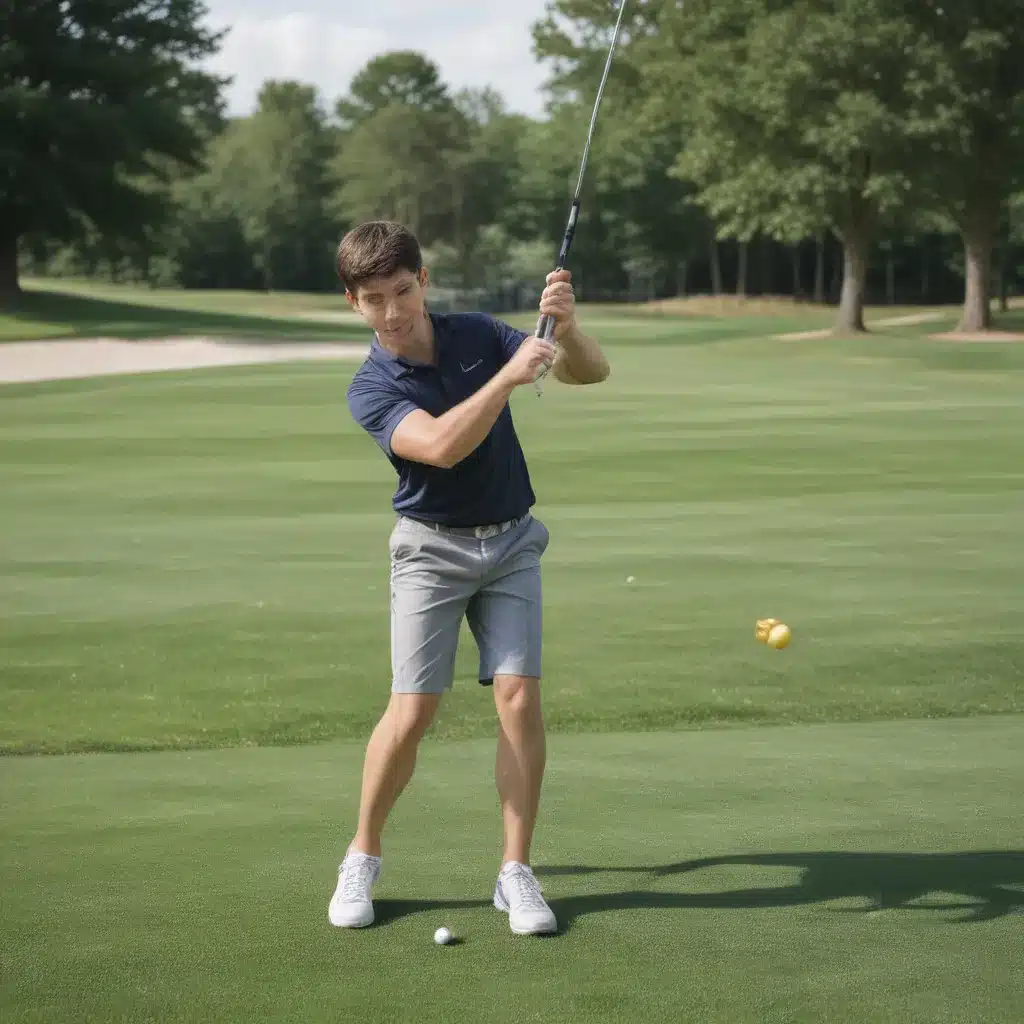Embracing the Journey: The Art of Deliberate Practice
Ah, the elusive pursuit of golfing perfection – a quest that has captivated players of all skill levels for centuries. As the proud owner of Eagle Ridge Golf Club, I’ve had the privilege of witnessing countless individuals embark on this journey, each with their own unique challenges and aspirations. And let me tell you, there is no one-size-fits-all approach to mastering this game we love.
However, there is one universal truth that I’ve come to embrace: the power of deliberate practice. You see, the secret to unlocking your full potential on the greens doesn’t lie in the latest gadget or the most expensive equipment. No, my friend, the key lies in how you approach the time you spend honing your skills.
Think about it this way – when was the last time you truly immersed yourself in the art of practice? I’m not talking about the casual rounds with your buddies or the occasional range session. I’m talking about the kind of deliberate, focused effort that transforms mere talent into true mastery.
Unlocking the Secrets of Deliberate Practice
Deliberate practice is the holy grail of golf improvement, and it’s not as complicated as you might think. The essence of it lies in the ability to identify your weaknesses, create a plan to address them, and then relentlessly execute that plan with laser-sharp focus and tenacity.
Let me break it down for you: first and foremost, you need to take an honest, critical look at your game. Where are the areas that need the most attention? Is it your putting stroke? Your ball striking? Your course management? Identifying these pain points is the foundation upon which you’ll build your practice sessions.
Once you’ve pinpointed your areas of improvement, it’s time to get to work. But here’s the catch – your practice can’t be a mindless exercise in repetition. No, you need to approach it with a deliberate, methodical mindset. Imagine yourself as a scientist, conducting experiments and analyzing the results.
For example, let’s say you’re struggling with your driver. Instead of just blasting ball after ball down the range, try this: set up a target, and focus on hitting a specific shot shape or trajectory. Pay attention to the adjustments you make in your swing, and track the results. Assess what’s working and what’s not, and then make the necessary tweaks.
Harnessing the Power of Deliberate Practice
Now, I know what you’re thinking – “But wait, isn’t that just going to make my practice sessions even longer and more tedious?” Well, my friend, that’s where the magic happens. You see, by embracing the process of deliberate practice, you’re not just improving your golf skills – you’re also training your brain to become a more efficient, effective learner.
Think about it this way: when you approach practice with a focused, analytical mindset, you’re engaging your cognitive faculties in a way that simply can’t be replicated by mindless repetition. You’re developing the ability to identify problems, formulate solutions, and then put those solutions into action. And the more you do this, the more you’ll start to see the dividends pay off on the course.
But don’t just take my word for it. Let’s look at a real-life example of how deliberate practice can transform a golfer’s game. Take, for instance, the case of Jane, a member at Eagle Ridge Golf Club who came to me a few years ago, frustrated with her inability to break 90.
Jane had all the raw talent in the world, but she just couldn’t seem to put it all together. That is, until she embraced the power of deliberate practice. She started by identifying her biggest weaknesses – her putting and her inability to hit consistent fairways. From there, she developed a practice regimen that focused on these areas, using the principles of deliberate practice to hone her skills.
Instead of just mindlessly rolling putts, Jane would set up specific drills that challenged her to make precise, controlled strokes. She’d measure her results, analyze what was working and what wasn’t, and then make the necessary adjustments. And on the driving range, she’d work tirelessly on her ball-striking, focusing on creating consistent, repeatable swing mechanics.
The results were nothing short of remarkable. Within a year, Jane had shaved 8 strokes off her handicap, and she was regularly breaking 80. And the best part? She was having more fun on the course than ever before. Why? Because the process of deliberate practice had transformed her from a frustrated golfer into a confident, self-assured player who truly understood her game.
Maintaining Motivation: The Key to Sustainable Improvement
Of course, the journey of deliberate practice is not without its challenges. There will be times when progress feels painfully slow, or when the monotony of repetition starts to wear you down. But that’s where the true test of your commitment lies.
You see, the secret to sustainable improvement in golf isn’t just about the practice itself – it’s about your ability to stay motivated and engaged throughout the process. And that’s where I can offer you a bit of advice from my own experience as a lifelong golfer and club owner.
First and foremost, it’s crucial to set small, achievable goals for yourself. Don’t overwhelm yourself with lofty aspirations – instead, focus on making incremental improvements, one step at a time. Celebrate your victories, no matter how small, and use them as fuel to keep you going.
And don’t be afraid to mix things up, either. Variety is the spice of life, and the same holds true for your practice sessions. Try incorporating different drills, challenges, and even some friendly competition to keep things fresh and engaging.
For example, you could set up a putting challenge with your buddies, where you each take turns trying to sink a series of tricky putts. Or you could challenge yourself to hit a certain number of fairways in a row on the driving range. The key is to find ways to make practice fun and rewarding, rather than just a monotonous chore.
Finally, remember to take time to reflect on your progress. Keep a practice journal, where you can track your successes, analyze your setbacks, and document the lessons you’ve learned along the way. This not only helps you stay accountable, but it also allows you to appreciate just how far you’ve come.
Embracing the Passion: The True Rewards of Deliberate Practice
At the end of the day, the pursuit of golfing excellence isn’t just about the numbers on the scorecard – it’s about the journey of self-discovery and the joy of the game itself. And that’s why I’m so passionate about the power of deliberate practice.
You see, when you approach the game with a deliberate, focused mindset, you’re not just improving your skills – you’re also unlocking a deeper connection with the sport you love. You’re tapping into a level of engagement and satisfaction that simply can’t be found in the casual round or the occasional range session.
So, my friends, if you’re ready to take your game to the next level, I invite you to embrace the art of deliberate practice. It may not be easy, and it may not be quick, but I can promise you that the rewards will be well worth the effort.
And who knows – maybe one day, I’ll see you out on the course at Eagle Ridge Golf Club, proudly displaying the fruits of your labor. Until then, keep practicing, keep learning, and keep enjoying the game that has brought us all together.
I’ll see you on the greens!


